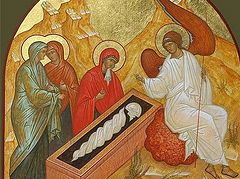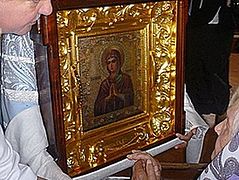Source: Eastern Christian Insights
May 15, 2016

Acts 6:1-7
Mark. 15:43-16:8
We all know what it is like to receive shocking news. Sometimes it is simply impossible to be prepared to hear an astounding message that we did not expect at all. Today we commemorate the people who received the most shocking news of all time from the angel: “Do not be amazed; you seek Jesus of Nazareth, Who was crucified. He is Risen. He is not here…Go tell His disciples—and Peter—that He is going before you to Galilee; there you will see Him, as He said to you.”
These first witnesses to our salvation were all women who expected to find the dead body of Jesus Christ in the tomb. They saw Him die on the Cross and now went to anoint Him properly for burial. Like the disciples and everyone else, these women did not expect the resurrection. We can only imagine how sad, scared, and terribly disappointed they must have been as they rose very early on Sunday morning to take their sorrowful journey to His tomb. When they got there, these women–the Theotokos, Mary Magdalen, two other Mary’s, Johanna, Salome, Martha, Susanna and others whose names we do not know–were the first to receive the shocking news of the resurrection of our Lord, God, and Savior Jesus Christ.
We also remember today Sts. Joseph of Arimathea and Nicodemus, prominent Jewish leaders who were also the Lord’s secret followers. Joseph “took courage” and risked his position and perhaps his life by asking Pilate for the Savior’s body. He took Him down from the Cross and, with Nicodemus’ help, wrapped Him in a linen shroud and put Him in a tomb.
Not only must the women and the men we remember today have been torn apart with grief at the death of Christ, they were surely afraid to be identified with One Who had been rejected, condemned, and publically executed as a blasphemer by the Jews and a traitor by the Romans. Nonetheless, they found the courage to do what devotion to their Lord required, regardless of their pain and fear. They served Christ in the only way still available to them by providing Him a decent burial.
There is a powerful realism about this story, for it certainly does not read like something made up after the fact. The Lord’s disciples are not even present in it, for they had run away in fear at His arrest. St. Peter, the chief disciple, had denied Him three times before His crucifixion. The first witnesses of the resurrection are all women, whose testimony had no authority in that time and place. Moreover, they went to the grave in order to anoint His dead body, not to find an empty tomb. Like them, Sts. Joseph and Nicodemus viewed Christ simply as one of the dead at that point. If someone were trying to make up a story to support the truth of the resurrection and to build up the credibility of the first Christians, this would not be the way to do it. It is, however, the perfect way to bear witness to the shocking truth of what no one expected, of what makes no sense according to our usual ways of thinking, and of what truly happened on that great and holy day when Life first dawned from the tomb.
As we continue to celebrate the glorious season of Christ’s Passover from death to life, we must not lose the sense of disorienting shock that the myrrh-bearing women received when they saw the stone that had been rolled away from the door of the tomb and heard the message from the angel of the Savior’s resurrection. What happened was so amazing that “they went out and fled from the tomb; for trembling and astonishment had come upon them; and they said nothing to anyone, for they were afraid.”
Too often, we take the good news of Christ’s victory over death for granted as part of a story that we know quite well. Even as we are accustomed to the intensified prayer, fasting, and repentance of Lent, we get used to the joyful celebration of the season of Pascha each year. A way to reopen the eyes of our souls to the unique and extraordinary nature of the Lord’s resurrection is for us to put ourselves in the place of the myrrh-bearers and of Sts. Joseph and Nicodemus by struggling to overcome anything that would hold us back from devoted service to Jesus Christ, even when it is not easy. Nothing that these holy women and men did in the aftermath of Christ’s death was fun, popular, or safe. We can be sure that they would have all strongly preferred to be doing something other than burying their friend and Lord. But they overcame those struggles and pressed on in serving Him in the only way available to them. If they were to love Him then, they had to give Him a proper burial.
Our situation is obviously different, for we live well after the Lord’s resurrection. Nonetheless, the spiritual challenge is the same. No generation gets to pick the circumstances that it faces. Human beings do not get to choose the illnesses, tragedies, or other problems that they encounter. It is not entirely up to us what temptations and weaknesses challenge us, our marriages, and our families spiritually, morally, or in any other way. Indeed, if we pretend that we get to pick how to serve our Lord in ways that suit us, we will likely ignore what He is actually calling us to do. Our challenge is to be faithful in responding to the situation that is before us, in discerning how to bear witness to Christ’s victory over death in the here and now, even if we would rather be doing something else.
The Church in Jerusalem faced a similar situation when there was strife over the daily distribution of bread to widows of different ethnic backgrounds. The apostles were too busy with their ministries to address that problem, so they ordained the first deacons to serve the practical needs of the community. And as a result, the Church flourished. We can be sure that the apostles would have preferred for such problems not to have arisen at all. But that is not what happened. When the problem arose, they had to find a way to address it. To have ignored it because they did not like it would have been to ignore God’s calling to them and to have refused to serve Christ in His Body, the Church.
We will grow in our participation in the Savior’s victory over sin and death by humbly accepting the opportunities for serving Him that our lives, and the lives of those around us, present. Most of us need look no further than our own families, our parish, and our friends and acquaintances in order to discern quite clearly what God is calling us to do. If we want a Lord Who fits our preconceived notions and calls us to serve Him only in ways that we find convenient, pleasing, or easy, then we will fall into the idolatry of worshiping our own self-centered delusions. Remember that our Lord’s empty tomb was an unexpected shock from which the women initially fled in fear. But what was at first so terrifying turned out to be a blessing beyond anyone’s expectations. Had the women not put themselves in the place of humble obedience and service, they would not have been the first witnesses of the resurrection. And our lives will not bear witness to the joy of Christ’s great victory unless we do the difficult work of serving Him in whatever circumstances we face, regardless of whether we especially like them or not.
Pascha was truly disorienting for all our Lord’s followers. It did not fit with any conventional expectations for religion in that time and place, and it still does not. In order to participate more fully in the life of our Risen Lord, we must follow the example of those blessed women and men who, in the midst of their fear and pain, did what needed to be done in order to love and serve Christ, even though they could not imagine what was to happen next. Theirs was not a self-centered, sentimental, or culturally accommodated spirituality, but a way of living that opened them to the new day of a Kingdom not of this world. The shock of the empty tomb was overwhelming, but that was necessary in order to open their eyes to news so good that nothing could have prepared them for it. This Paschal season, let us follow their holy example so that our eyes will also be opened to the brilliant light that continues to illumine even the darkest grave. As the angel said, “Do not be amazed; you seek Jesus of Nazareth, Who was crucified. He is Risen. He is not here…Go tell His disciples—and Peter—that He is going before you to Galilee; there you will see Him, as He said to you.”



